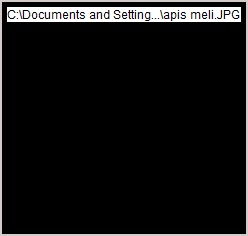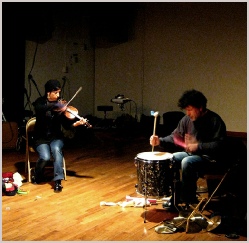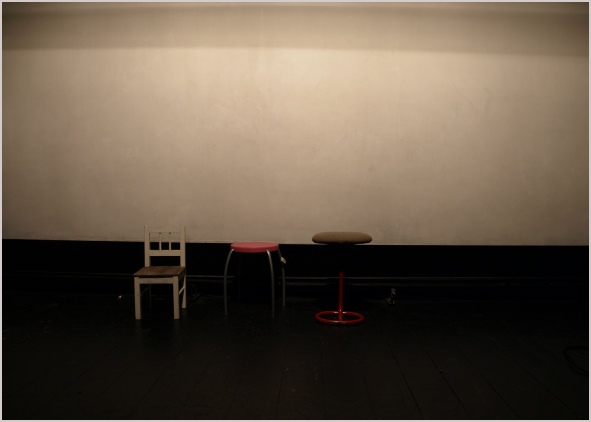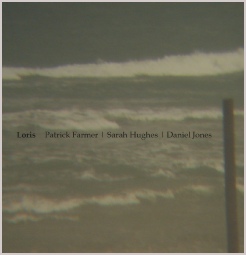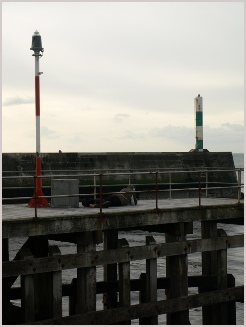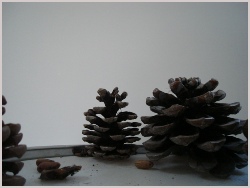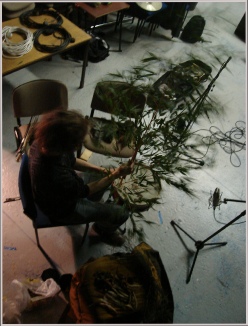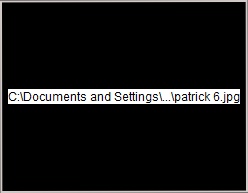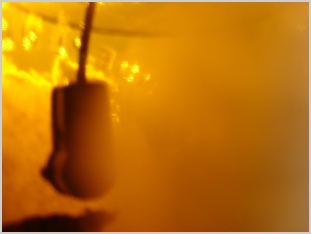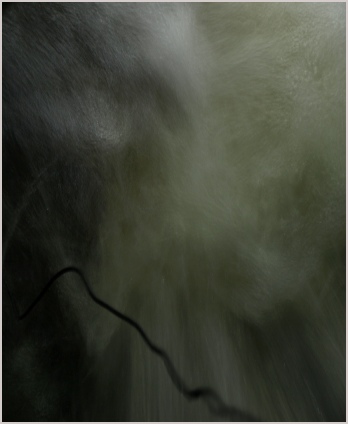Another Timbre TimHarrisonbre
Interview with Patrick Farmer, November 2009, on the release of ‘The Cat from Cat Hill’
First of all when and how did you get into experimental music?
For me all paths lead back to Tom Waits; he's just one of those intriguing figures you gravitate towards. Waits obviously plays with a revolving cast of wonderful musicians, and for me the most significant of said musicians would be Gino Robair. Gino's responsible for a large part of my early 'percussive' development through his album 'Singular Pleasures'. From there on I remember John Zorn being quite a major figure as I was starting to investigate experimental music, and then of course Richard Pinnell with his warmly received and copious recommendations. I'll still happily listen to Waits and Robair, but I seem to have lost whatever drew me towards Zorn.
I love the disc apis mellifera'that you released on Kostis Kilymis's Organised Music from Thessaloniki label. You use recordings of bees that you gently and beautifully transform in various ways. It's very effectively achieved, but is a very simple, ecologically minimal idea. Is there an ecological aspect to your approach to music?
I've slowly come to the realisation that everything I do resides under a biophilic roof. I very much dislike the attitude that some people maintain as to artists being above any degree of responsibility except to their own art, that they are above picking up after themselves and can live within an utterly selfish manner because of the very fact that they are artists. It's all commonsense really, and is not, of course, solely applicable to artists; it applies to anyone who is in a position to be able to consider things such as this. Listening, looking, using any of the senses whether indoors or out, to me, is a series of constantly humbling experiences, a never-ending plateau of significance that instills in one a wonderful sense of how insignificant we really are, and a realisation of the joy and significance that can arise from such perceived insignificance. I've asked myself time and time again as to whether there is any ecological purpose within what I do and I've never really come up with anything that is any way satisfactory, and I think that is one of the main reasons why I keep working. I can't see myself ever coming up with an answer.
Since apis mellifera was released I've often had the good fortune to observe and record honeybees, and after a few recording trips I found myself presented with quite a lot of diverse sound material. I did think about perhaps letting my own ways of hearing the world come into play again and editing the material down, chopping it up, etc. But after a lot of daydreaming I decided to just leave the material as it was, chop off a little at the beginning and at the end and try and leave my interference to a minimum. What I was left with were about eight excerpts of sound that I think represent what can be heard in a hive much more honestly than any piece that I could have edited or processed myself. The range of sounds these insects create is really quite staggering, which leads me to a very large factor in my reasons for recording micro environments such as these, pure intrigue, a curiosity borne out of constant questioning and a respect for the world around us, especially the world we can not see or hear. I decided to put the recordings up on compost and height as the ethic of the site seemed in keeping with my recording intentions.
Your activities as a musician seem to cover a wide range, from field recording to percussion through electronics to the use of found objects and unconventional instruments. Is this diversity something you consciously choose, or does it just happen?
The degree of similarity within varying approaches, techniques and so forth, the environments that dictate most of what I record or collect, to whatever surface I may choose to utilise with whatever series of objects, I believe to be all intrinsically linked. During my degree I realised how similar many of the drones that I try to create with various drum heads are to a lot of the field recordings that I go out 'searching' for, and also the techniques utilised in engaging them. I like to spend a lot of time walking and thinking about the dense unification between the processes of finding materials for preparation, how my field recordings inform my playing, and how the walks inform what objects I use. It's all so hypersensitive. When you're out location-scouting you are given the chance to get to know an area, to survey it intimately, and the particular desire or desires you approach a soundscape with can shape your evaluation of it. Viewing common elements of life, such as a stretch of fencing or honeybees, in this way imbibes you with an altered perspective. Walking throughout the day to find a particular area where the fence’s sonority matches that of the wind power can encompass you entirely. Such prolonged periods of observation and quiet inevitably create many questions and lend themselves to much confusion, a great deal of which appears in my work, but it is a confusion I am happy to accommodate.
Many contemporary music fans of my generation have gone through years of weighing up the pros and cons of improvisation versus composed music. I get the impression that for you there is no 'versus' about it; you seem happy and refreshingly open to working in improvised contexts and to perform scored pieces. Do you have preferences either way? Is it an issue for you at all?
I have much more experience working in improvised contexts than I do with scored pieces, but I definitely don't have a preference as that depicts some sort of hierarchy. Let’s say that I lean towards a rhizomic train of thought, a kind of fugue whereby these varying processes are all indubitably connected and branch off as often as they return, the varying boughs bringing and taking with them various new experiences trying to recapture the naïve amazement of initial observation, and the joy that new sounds can bring. Intermingled within improvised and composed musics I also find a constant source of inspiration in literature. In recent times there has been no larger influence on me than the writings of Philippe Jaccottet, Francis Ponge, Italo Calvino, Andrei Platonov, Emile Zola, etc etc.
Are there any musicians or composers who you feel have particularly shaped your approach to music?
I feel that pretty much every musician I've had the good fortune to play with has altered me in some way or another. I've been so lucky to play with people like Ryan Jewell, Jez riley French, Angharad Davies, Matt Milton, Dominic Lash, etc etc, and knowing people like Lee Patterson, Jeph Jerman, Benedict Drew, Seymour Wright, David Lacey, Michael Pisaro, Mark Wastell, I'm just some kind of quasi constant amorphous existent that has simply imbibed all these joyous occurrences. Most of the people I have met through such music are very warm, friendly and positive, microcosms of the music itself.
Tell us about Loris, and how the recording session that became 'The Cat from Cat Hill' came about?
Originally I'd arranged with Dan Jones to record him solo at the university where I was studying at the time, as he is woefully under-recorded for someone of such genuine ability. Then we also arranged to record a few duo sets. I was talking to Sarah the night before the recording, saying how much I dislike having to record whilst playing and monitoring everything at the same time, so she offered to come down and help out. Events transpired and she, thankfully, brought her zither down to the studio. I can't really imagine the recording without her presence; a lot of the soundworlds that Dan and I share are very similar, and having Sarah there just threw our playing out the door and enabled us to treat the situation with a lot more clarity and animation.
The title is a little nostalgic, as the campus we recorded in is called Cat Hill, and for the last two years in university a cat was adopted by the university, a cat of ample proportions that would happily sit on top of the bookshelves in the library and once, I believe, sat on Sarah's lap for about an hour.
You arrived in London with a whirlwind of energy and set up or got involved very quickly in lots of projects. What did you make of the London scene, and is it going to be hard being away from the metropolis where, for better or worse, the vast majority of experimental musicians in the UK live and work?
None of it was conscious at first, it just all seemed to happen. I can't remember my first gig at Cafe Oto, which was pretty much where I played all of my London shows. I was touring a lot more then than I am now and had made a lot of good friends through putting on shows in Nottingham, and when I moved down obviously they were all playing in and around London at some point or another, so things just really took off from there. I don't miss London, I love being in the country. I obviously miss the people there, but it's just another way of looking at the same picture.
This does feel like an exciting time in contemporary music, with new figures emerging and new connections being made between different 'schools' or groups of musicians and composers. You yourself are shortly going to perform works by two of the Wandelweiser group of composers (Michael Pisaro and Manfred Werder) at a concert in Bristol with the musicians from Loris plus Matt Davies and David Thomas. Is this at least one of the directions that you see yourself moving in?
Reading over Manfred and Michael's text-based scores is a wonderful string of experiences in itself, regardless of realising them in the public domain, and I think a lot of it comes down to the period before the recording or the performance itself. A dominant aspect of field recording is the location scouting, the searching, standing still, revisiting a location time and time again with varying intent, the thoughts that present themselves to you and the thoughts you present yourself to, and I think a lot of what appeals to me about scores by people like Manfred and Michael is just that: the time spent beforehand, the consideration and the varying moments spent in their presence.
As well as making music you (together with Sarah Hughes) run the remarkable Compost and Height label and website (http://compostandheight.blogspot.com/). You seem to have a commendably open policy in terms of accepting material on the website from a wide variety of musicians. Do you seek out submissions, or simply take things that are sent to you? Do you have clear criteria for taking material, and are there things that fall within the general area of experimental music that you wouldn't put on the website?
Both Sarah and I used to put on shows, in Sheffield and in Nottingham, and when we moved to London we wanted to carry on doing something but we didn’t really want to carry on promoting, so we came up with the idea for the label. It developed a lot quicker than we thought. I remember us looking through Logic of Sense by Deleuze and trying to come up with a name for the label, developing some kind of environmentally aware manifesto that we could work from, and then simply asking a few people whom we both admired to send us some of their work. From then on the response has been really overwhelming. So many people have helped us get the label off the ground, and so many people continue to introduce themselves to us through their wonderful work. We haven't really sought out a submission for a while now, although one thing we would love to do, and have wanted to do since the label’s conception, is be host to more writing!
As in keeping with the ethos of the label, the content of the writing would be very open, but we are certainly after a more, shall we say, conscientious, consilient, approach to a work… Having said all that, the best thing for us about the label has been getting to know people like Ben Owen and Adam Sonderberg through their submissions, and then the friendships that develop from that point. Friendships that probably wouldn’t have existed if it were not for the label. That's really a wonderful thing.
